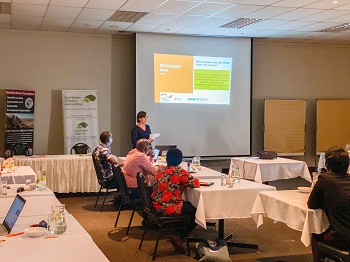
Programme to boost local organic agriculture launched

The Namibian Organic Association (NOA) and the Namibia Nature Foundation (NNF) recently launched country activities for the Knowledge Hub for Organic Agriculture in Southern Africa (KH SA) that aims to promote the adoption and scaling-up of organic agriculture in the region.
Four Knowledge Hubs for Organic Agriculture are implemented by GIZ in North, West and Eastern and Central Africa, operating in Zambia, Namibia and South Africa with plans to extend the project to Malawi in 2021. The South African-based Sustainability Institute provides support for the regional project. NOA and NNF lead project activities in Namibia.
The project aims to close the knowledge gaps that limits the sharing of organic agriculture production methods in Southern Africa. Namibian project activities aim to grow the number of organic growers and volume of organic food produced in the country. The project will further be supported by the development of an online platform to disseminate context-specific knowledge about organic farming in Africa.
It will help by gathering and sharing information with Namibian farmers to allow them to benefit from practices that are environmentally friendly and sustainable.
Mareike Aufderheide-Voigts, Namibian Project Manager, said introducing organic agriculture practises to Namibia’s agricultural system will help the country combat climate change, rejuvenate agricultural soils, reduce agricultural water usage and produce nutrient-dense food.
“Organic agriculture in the Namibian context refers to an inclusive approach to certified and non-certified organic agriculture production systems such as conservation agriculture;
regenerative, biodynamic, biological and ecological farming; permaculture, agro-ecology and agroforestry systems, as well as climate smart and climate resilient production systems,” said NOA Chairperson Eckhart Foertsch.
Organic food production is increasingly viewed by international organisations such as the United Nations as a strategic way to address challenges of rural poverty, malnutrition,
biodiversity loss, particularly in a time of climate change.
The United Nations Children’s Fund notes that 25% of children under five years of age in Namibia are stunted and that malnutrition is widespread in the country. Organic agriculture can be a pathway to addressing not only hunger and malnutrition but also other challenges including poverty, water use, climate change, and unsustainable production and consumption.
“The Namibian agricultural landscape continues to develop at an amazing rate and an initiative like this that equips farmers with the skills to practice more sustainable agriculture is of utmost importance. I am optimistic we will see more practices and methods used in farming with and not against nature,” said Angus Middleton, Executive Director of the Namibia Nature Foundation.
Meanwhile, the next step in the project is to engage stakeholders and ensure that their recommendations are considered in project implementation. Engagements will take place online and face-to-face, COVID-19 regulations permitting, they concluded.











































